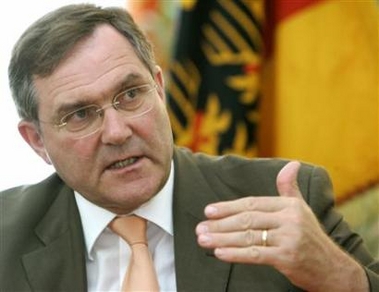Germany could accept nuclear enrichment in Iran
(Reuters)
Updated: 2006-06-29 15:06 Iran should be allowed to enrich uranium for power
generation provided there is close monitoring by U.N. inspectors to ensure it is
not trying to develop atomic weapons, Germany's defense minister said.
The minister's comments may suggest that after years of
failed negotiations with Iran, Germany and some other Western powers were
willing to compromise with Iran over enrichment in order to resolve peacefully
the nuclear stand-off with Tehran.

German Defence Minister Franz
Josef Jung during an interview with Reuters at the defence ministry in
Berlin, June 26, 2006. [Reuters] |
But it was clear that this view was unacceptable to Washington, which
contacted the German government to clarify it and said Berlin had dismissed the
Reuters story as "erroneous."
But the German government did not challenge the story.
In an interview with Reuters this week, Defense Minister Franz Josef Jung was
asked if Iran should be allowed to enrich uranium under the scrutiny of the
Vienna-based International Atomic Energy Agency (IAEA).
He said: "Yes, I think so. The offer includes everything. That means the
civilian use of nuclear energy is possible but not atomic weapons. And
monitoring mechanisms must be applied. I think it would be wise for Iran to
accept this offer," he said.
Jung was referring to a June 6 offer of incentives made to Iran by Germany
and the five permanent U.N. Security Council members -- the United States,
Britain, France, China and Russia.
State Department spokesman deputy spokesman Adam Ereli denied there were any
divisions among the major powers. He said that the German government had been
contacted about the interview and told Washington "this is an erroneous story."
|